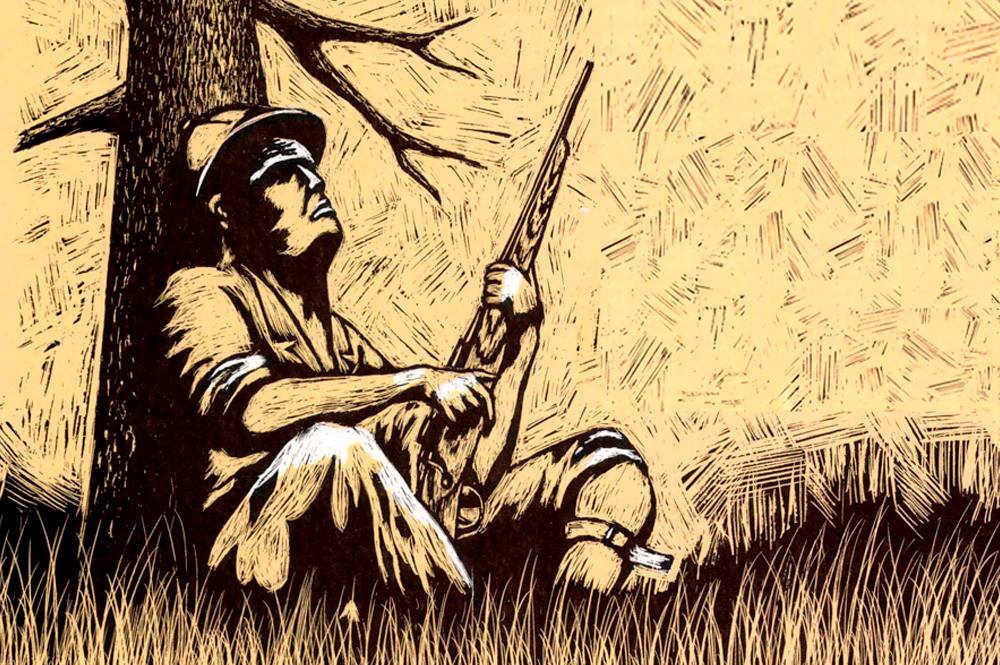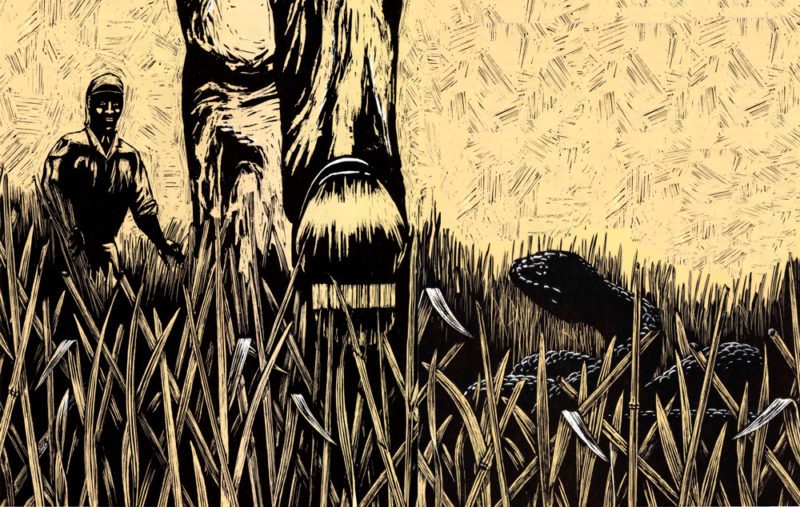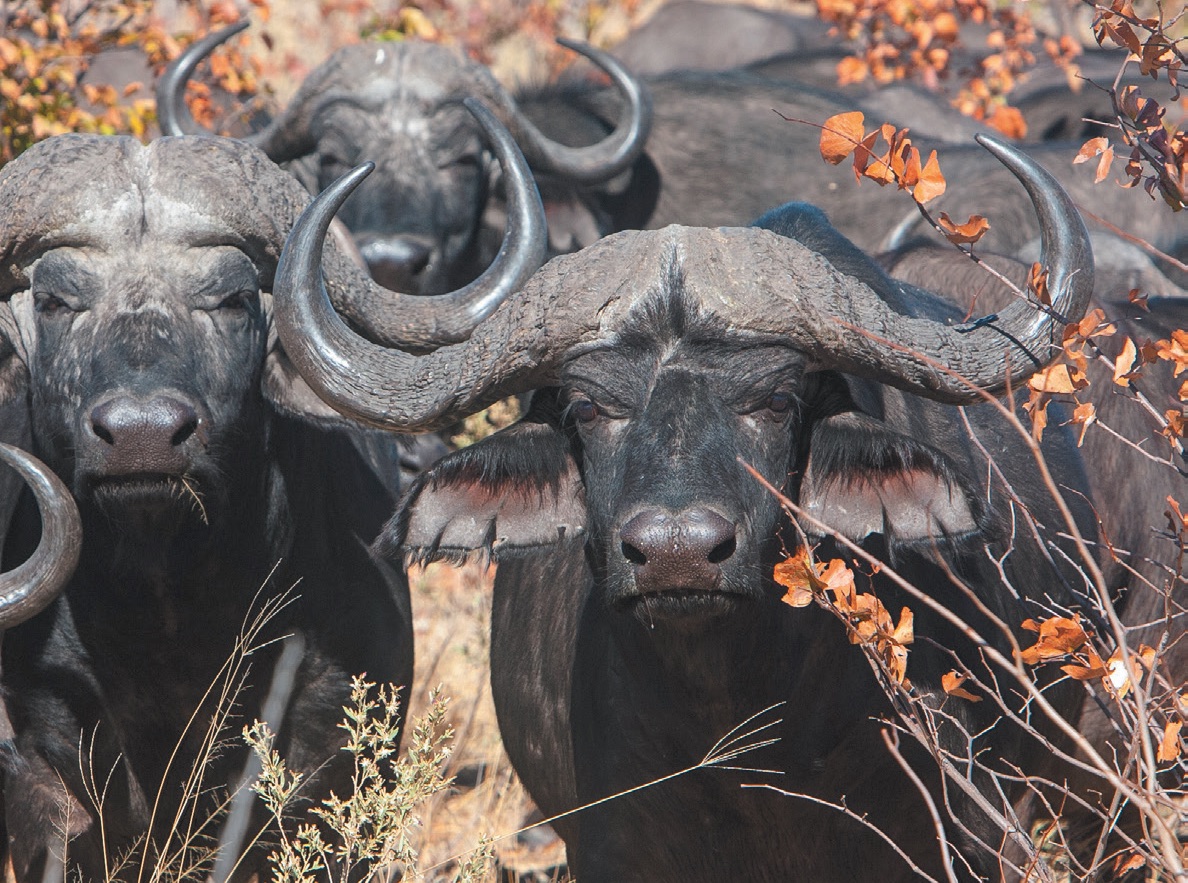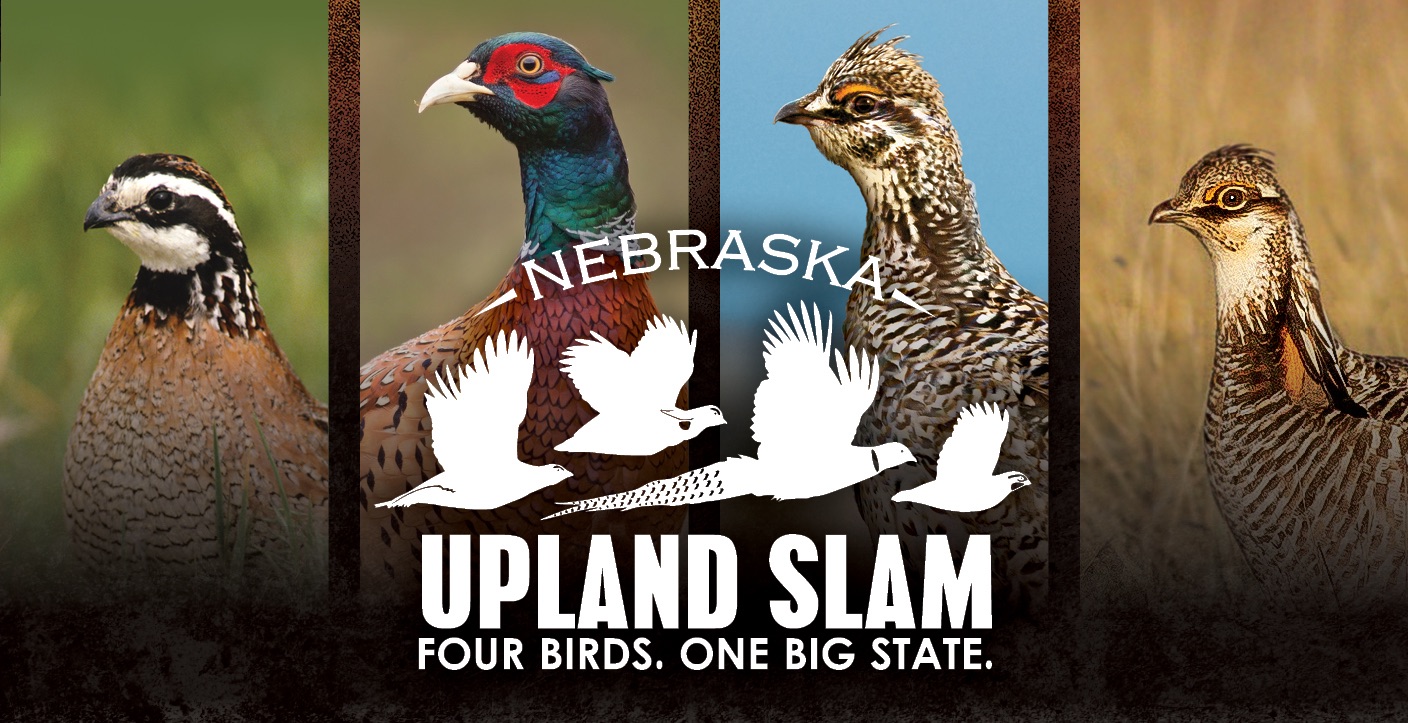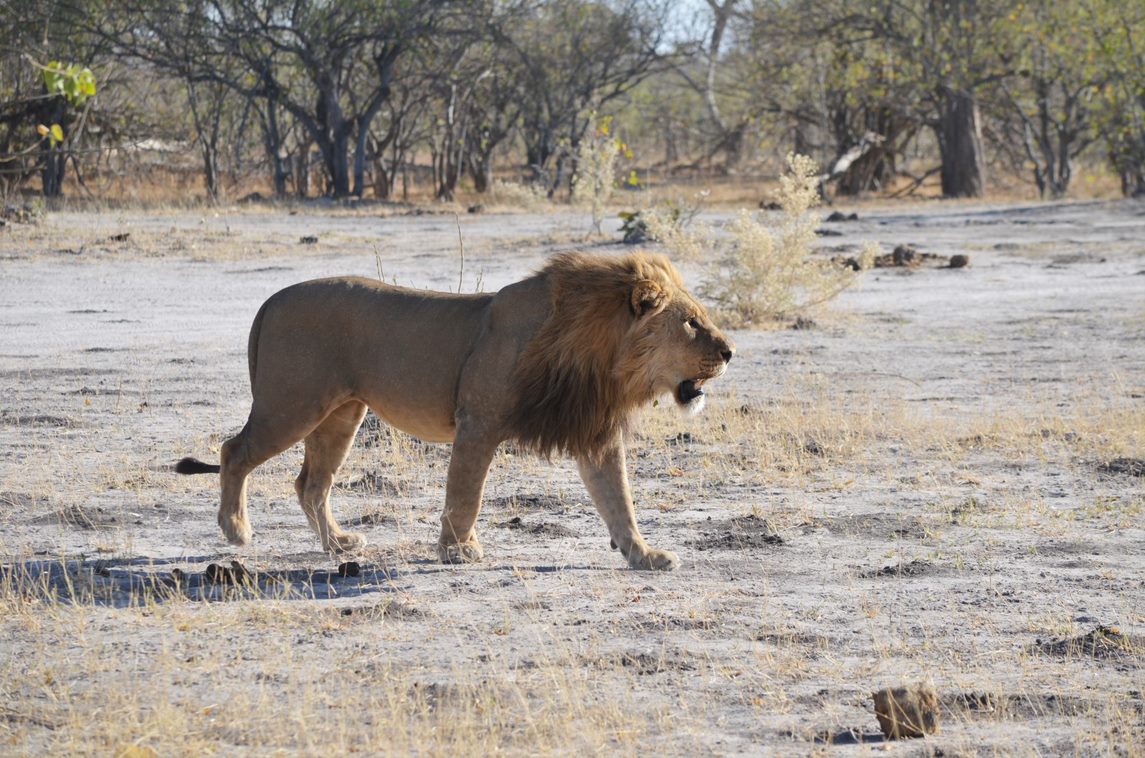A mamba. It was over. He registered with a terrifying shudder that he had somewhere between two and twenty-four hours left to live.
It was toward the last of his safari that it happened. Having successfully collected nearly every big game animal that he had come for, Jackson Taylor set out one afternoon on foot from camp with Shabani, the tracker, looking for guinea fowl. They had stumbled across one or two coveys of the crested variety, and he was having a grand time shooting at them and missing as they dodged between the dry tufts of grass and scrub, while Shabani, trotting along behind, shouted in Swahili for him to shoot again and again.
But the flocks of hustling guineas stayed wisely ahead, just out of range. When he slowed, they slowed; when, upon recovering his strength, he pushed forth with a sudden burst of speed, so did they. Only when he happened onto an unsuspecting flock did he manage to get one before they took to the air. And they had thundered up from the ground with the commotion of a flock of wild turkeys, eventually returning to the ground and to the use of their seemingly inexhaustible legs some hundred yards away. But the chasing was as much fun as the shooting, and so he had kept after them even when he knew the effort was futile.
In between flocks, he and Shabani would stop to catch their breaths and wipe the sweat from their brows. Inevitably, Shabani would commence with trying to get some point across, resorting at last to hand signals that were often as unsuccessful.
The sun was still high above the trees, mostly acacia and mopane, and the ground had become black with the charred remains of a sizable burn. Only the dry, head-high grass, runty bits of scrub, and any fallen trees or discarded limbs littering the ground had been burned. Healthy trees were left untouched, and new green shoots of grass poked up here and there like cat whiskers all across the burn.
“Kanga upes!'” Shabani said in gasps, as they came to a stop after another unproductive but invigorating chase. It was something about guinea fowl, but Jackson wasn’t sure what.
“Upesi? ” Jackson asked huffing.
“N’dio. Upesi mingi sana,” he told him, his big yellow teeth showing as he grinned.
Jackson had to shrug.
“Upesi. UPESI,” Shabani said, as though repetition alone should make the meaning clear.
Finally Shabani gave up, resorting to the tried and true. “Jua kali,” he said; literally “Sharp sun,” which Jackson had learned on his first day meant that it was very hot.
“Jua kafi!” Jackson agreed strongly, wiping his forehead once more.
His shirt was soaked through at the neck and under the arms, and he could feel beads of sweat running down his back. But it was a pleasant, exhilarating feeling. And his head was swimming with the slight euphoria that comes from pushing oneself to exhaustion. If asked, he probably could not have thought of a happier, more exciting time in his life than right then.
After another minute’s rest, they started on. Soon they came to a part of the river—the same narrow, smooth-flowing river that ran out in front of the camp—which now wound its way through large, fiat topped acacias and the beginnings of the wait-a-bit brush that grew here in clumps, but eventually very thick as it approached the rocky hills beyond. It was at the base of these hills that they had gotten a large male leopard. He and professional hunter Robin Smith.
It had come just at dusk to feed on an impala bait hung from the high, well silhouetted branch of an acacia. And Jackson’s heart had charged into his throat when, sitting in the grass-thatched blind, he first heard the leopard’s claws bite into the bark of the tree. Any distance between them shrank instantly to nothing when, at a nudge from Robin, he eased the barrel of his rifle through the tiny grass ring of a peephole and through the scope saw the spotted cat, crouched bigger than life on the limb above the bait, turn its head in their direction and cast its cold, green eyes on the blind.
It was like coming face to face with a killer in a dark alley. It didn’t matter that the killer did not have a gun. The killer had claws that at a single swipe could disembowel him as handily as a surgeon’s scalpel and jaws that could crush the vertebrae at the back of his neck.
Jackson had been quite ecstatic about killing it with one shot, for he had read many accounts of how easy they are to wound, and what a menace they are to follow up. That was three days ago.
Shabani grew watchful as they neared the river ‘s edge. And Jackson, noticing, likewise peered as best he could into the shady clumps of brush along the bank. A shotgun was no match for an angry hippo or a rogue buffalo bull should one decide to explode out at them. Just five days before, Jackson had seen—or rather hadn’t seen how well a wounded buffalo could hide himself in even the tiniest patch of scrub.
He and Robin Smith had just rounded one such clump, following ever-so-cautiously the generous blood trail the bull had left behind, their rifles clenched at port arms, their eyes darting searchingly about the brush, when little less than ten short steps away there came an abrupt snort. And then the whole forest had seemed to explode at them. The wounded bull appearing from nowhere stormed out from behind a patch of thorn and plowed toward them with the thunder of a hundred charging horses, its heavy horns raised and ready to wage battle, its black mass billowing up behind.
Robin had hammered it in the shoulder before Jackson had even gotten his safety off. Yet, when after only a slight stumble the bull came on, now headlong, Jackson managed a shot into its neck. Then Robin hit it in the nose with a .460 solid that dropped the bull in a cloud of dust almost at their feet.
Jackson was quite proud of himself, for he had not been fully certain how he would react under such a charge. Though beforehand you might promise yourself over and over again – even while calling the most horrifying scene to mind you can imagine that when the moment comes you will stand your ground to the end, that even when it appears certain that you are going to be gored or mauled or trampled that you won’t panic and throw down your gun and run – one can’t know for sure until he is put to the test.
Afterwards, after he had passed, Jackson Taylor felt invincible, as if there was nothing in this world he could not tackle. The world, along with any potential menaces it might possess, seemed such a peaceful, hospitable place.
He and Shabani were now working their way quietly along the riverbank. The brown, muddy water of the river was slipping past as opaque and thick-looking as milk chocolate. A loud splash came from somewhere down-river as an unseen hippo went crashing into the water. The uproar sent a family of baboons on the opposite bank scampering for the trees, hooting and hollering as they went. The pride male sauntered slowly after them, glancing now and then over his shoulder and baring his teeth. Just then a grassy patch burst to life with the leaping forms of impalas; like sheep, they sprang into the air one after another, and the males in a separate herd to themselves a hundred yards off stuck their necks out long and low so the tips of their lyre-like horns scratched at their backs.
The river was slipping quietly along on their left. To their right, a lofty, flat-topped acacia towered up from the sandy soil, casting its shade in patches about them.
They had crept but little farther when it happened. And Jackson only barely saw it coming out of the corner of his eye. Perhaps because he had been expecting, if anything, something big, like a buffalo, that it took him so by surprise.
They were passing between the river and the acacia, scanning both shores for the fleet-footed guineas, when Jackson became suddenly aware of a thin, fast-wriggling movement on the shady ground beside him. But before he could think to run or jump or even to shoot—it happened so incredibly fast—the snake had raised its head and bitten him through the pants on his calf.
Shabani jumped quickly aside, exclaiming, as the blackish snake whipped past him and then slithered over the bank of the river and into the muddy water.
“Christ!” Jackson blurted, as the realization hit. And it hit him as solidly as a bat hits a home run ball.
Dropping hastily to his knee, he jerked his pants leg up to his calf. He saw at once the terrifying proof that the snake had indeed bitten him two puncture marks were oozing droplets of fresh blood.
He looked hopefully to Shabani, who had squatted beside him and was probing the wound with his black fingers.
“What kind of snake?” Jackson demanded. After a blank look, Shabani began rattling away in Swahili, not one word of which did Jackson understand. “What kind of snake. Snake. SNAKE … What kind?” he cried.
Shabani presently rattled on again, and he said something about camp and something about Robin and something about the river, but nothing Jackson could understand about a snake.
There were probably 500 different species of snake it could be, 80 percent of them deadly. He knew further that poisonous snakes typically come with one of two types of venom: that which poisons the blood and tissues, and that which attacks the nerves, causing paralysis and finally death from either suffocation or failure of the heart. The former is comprised of the puff adder and the booms lang; the latter, the cobra and the mamba, both green and black.
Jackson felt certain it wasn’t a puff adder, as his tent boy had killed one in camp on the third day of safari, and he had studied It quite closely. They are a fat, sluggish-moving snake, With a spade-shaped head and reticulated markings. Nor was it a gaboon viper, another extremely deadly snake that he had seen inside a glass cage in the museum of Nairobi; which read the small plaque beneath the glass is maliciously gifted with both types of venom, and the ability to inject one or the other, or both. This snake had no fan to its head, either, which ruled out a cobra. And it was too big for a booms lang. Which left only one snake that he could think of that he did not want to think of because it was possibly the most deadly of all, and he pushed the thought quickly aside. Shabani was still rattling away, though Jackson could make nothing of it. Well aware of the fact that to slow the spread of any venom he should move as little as possible, Jackson now pointed back the way they had come and directed Shabani: “Camp! Robin! Get Robin!” He stripped off his belt and tied it snugly about his lower thigh, then limped to the acacia and slumped down with his back against its base.
“Camp! Robin!” he cried again, for Shabani had made no move to go.
But Shabani was soon waving a hand at him and shaking his head, his face showing true concern.
“Hapana, Bwana, ” he said. “Mamba mto. Mamba hapa!”
And at his words, Jackson felt instantly chilled all over, as if the temperature had fallen fifty degrees. The feeling intensified until it felt as if there were a thousand bugs beneath his skin, all crawling and scratching, trying to get out.
“Mamba, ” Shabani insisted, pointing to the river where the snake had disappeared. And then, recalling what Robin had told him earlier about the fatalist mind-set maintained by a good many Africans, it hit him why Shabani would not go. Shabani probably realized there was nothing he could do, and was telling him so. He should simply sit back and accept it.
“No!” Jackson roared. “Get Robin … Robin! Go!”
Shabani hesitated, looking a bit puzzled, and then motioned with his hand for Jackson to follow.
“No! Camp now!” Jackson pleaded angrily. By now he was almost ready to point the gun at Shabani to get him going. But after another minute’s stare, Shabani reluctantly whirled and started at a fast trot in the direction of camp.
Jackson, now alone, laid his head back against the tree, briefly wincing his eyes. So that was it, then. His worst fear realized. A mamba. It was over. He registered with a terrifying shudder that he had somewhere between two and twenty-four hours left to live.
The overwhelming thought numbed him from head to toe. Then, as it hit him again, he felt a great, suffocating pressure bearing down upon him as though he were pinned beneath the crashing spill of some giant waterfall. A second later a wave of nausea wracked his body. What surprised him, when it ceased, was what popped into his mind first of the things he suddenly realized he would never again see. They came piling painfully into his mind like the cars of a runaway train.
Strangely enough, his first thought was of Max, the family golden retriever. Then came his wife and his kids and his mother and work, and the desperate, compelling notion that somehow he must speak to his wife before he went. He must. But, God, what would he say? What could he say? Perhaps the safari company could place a call to his home in Houston from Arusha and broadcast it over the radio back to camp…if he made it back to camp.
He was going to die.
The recurring thought numbed him again. Then it sent a ripple of tingles through his body. It seemed that his entire life, that everything that he had ever said or done or experienced, had all been merely a hazy dream, and he was just now awakening these last few hours before he died.
It was as though he had been snapped strangely awake by a sense of total, horrifying awareness.
Everything appeared altogether different as he glanced around it all seemed to be so startlingly in focus and in color. It was almost as if he had been suddenly, but ironically, blessed with a badly-needed pair of eyeglasses, now, in his last hours. The leaves of the acacias were green as he had never seen, their branches surprisingly intricate structures, their bark a complex fascination. The blue sky budding above the fiat-topped trees and the few puffy whites pushing slowly overhead appeared alarmingly and strikingly real, as if all the thousands of skies and sunsets and panoramas he had seen in his lifetime, as he now recalled them, had been nothing more than a collection of lackluster imitations painted by some second-rate artist.
All around him the trees and the bushes and the tufts of grass seemed curiously alive; they fairly swelled with life and previously unnoticed movements. He guessed he had been too closely and intimately involved with them before to notice. Or perhaps, it took his looking at them away from life, from near death, to see all this. The occasional bits of breeze made sounds in his ears as he had never heard. When he glanced down, his hands how many times in his life had he seen his hands were a wonder to him. He discovered freckles he hadn’t known were there, and creases in the palms, and the exact shape and color and texture of his fingernails as though they had all along belonged to someone else and were just now his. He noticed a faint scar at the base of his thumb he’d picked up in the third grade while play-wrestling one of his classmates, and had all but forgotten. A callus on his right middle finger from pushing a pencil at work. And the small veins and capillaries that wormed their way beneath his skin like … like little snakes.
Jesus!
Just then he felt a marked shortness of breath. Was the poison taking effect already? It seemed so quick. He forced a deep breath and briefly shut his eyes. It felt much harder to breathe than normal. He could feel the beads of sweat returning to his forehead and neck, his heart knocking to get out of his chest, and he glanced down at the shotgun across his lap, which brought a haunting thought.
Now we ‘ll see if you put your money where your mouth is, he said to himself.
Five years ago, Jackson had watched his father wither and die with cancer. Toward the end, when the medications seemed hardly to dent the pain at all, Jackson had promised himself that should he ever fall prey to some debilitating disease, he would, without question, opt for a quicker way out.
With this in mind, he pulled the shotgun around and laid it lengthwise between his legs so the barrel was pointed at his chest. But he would wait, he told himself, until the pain became unbearable. Then he would do it.
He found himself pondering, with a startling rush of fear, whether between the eyes or in the roof of the mouth would be best. If he were lucky, maybe he would simply slip unconscious first before it got bad.
A second later, however, he was struck with an encouraging hope. The idea came into his head that he might beat it, that somehow he just might live.
But quickly striking down this wishful fancy was the recollection of something he had once seen on a television program about snakes. A mamba, angered by several villagers out hoeing in a field, had gone amuck and savagely struck thirteen natives before one managed to chop off its head. Before the sun set the following day, all thirteen had died.
Some had even made it into town for antivenin. But antivenin, administered in even the slightest amount too little or too much, can be equally deadly.
There was also the amazing story, which might have brought a glimmer of hope if he had only recalled it a little sooner, about a mamba victim who had actually survived a bite, the only person known ever to have done so. It was the story of a game biologist who, after having been bitten while milking a mamba for its venom, saved his own life by sawing off his thumb with the dull blade of a pocket knife in what he later claimed took less than 15 seconds.
Christ! Jackson thought bitterly, You just slit your own throat. If you’d been thinking instead of so busily chasing him back to camp, you could have gotten Shabani to cut it off at the knee, he cursed himself, recalling how quickly and skillfully the tracker had dropped the hindquarters off the buffalo.
If he’d had a knife, he might even have tried it himself. But he doubted, as he thought it through, that he could have finished the job without passing out first. And, anyway, it was probably too late.
Jackson drew another deep breath. It felt extremely shallow, with even a spot of pain as he breathed in deeply. He glanced down at the shotgun in his lap. It looked as new to him as the hands that now held it. God, let him hurry!
It was perhaps half an hour later, though to Jackson it seemed a good bit longer than eternity, before he heard the sound of the Land Rover approaching from upriver. Finally he caught glimpses of it as Robin came driving at top speed, weaving around the brush and trees and raising a large cloud of dust. He could see Shabani standing and hanging on in the back.
As the vehicle skidded to a stop in front of him, Robin smiled, and with a jubilant indifference and an expression quite unlike anything Jackson had expected, said, “Why, my good friend, you look as if you’ve just done battle with a buffalo and lost.”
Which stunned Jackson for a second. But then he blurted forth in a rush: “Have I a chance with the antivenin?”
“Antivenin?”
“Yes—For God’s sake, hurry and let’s try it.”
But Robin just sat there. He wasn’t looking at him with the expression of someone facing a man who was about to die. In fact, he was looking more like someone about to step down from the cab and join him for a cup of tea.
“You shan’t be needing any of that, I’m afraid.”
“Jesus! It won’t work on mambas?”
The rather queer expression returned to his face. “That wasn’t a mamba,” he said.
“It wasn’t?”
“Good Heavens, no. If it had been I’d be out a bloody bundle in trophy fees. Although I dare say I wouldn’t mind keeping that handsome kudu of yours for myself. It would hang quite nicely on my porch at home.”
“It wasn’t a mamba?” Jackson repeated in disbelief.
“Not at all.”
Still perplexed, Jackson glanced questioningly at Shabani, and said, “Well then why the hell was he crying ‘Mamba! Mamba!’ then?”
After half-turning his head to make a quick exchange in Swahili, Robin grinned widely from behind the wheel, then fell at once to laughing. He carried on again in Swahili, and now Shabani was laughing.
“What? What’s so funny?” Jackson demanded. “What is it?”
“I—I’m sorry, Jackson,” Robin said, trying to compose himself. “You poor, poor bugger…” and he broke into another laugh. “But you misunderstood him completely. Shabani wasn’t telling you that you were bitten by a mamba. Christ! He was trying to tell you not to sit so close to the river because of the crocs…You poor chap; mamba in Swahili means crocodile. You’re not going to die! That was just some rubbish water snake that got you. Shabani had quite a good look at it. They’re completely harmless, I assure you.”
It took a second for what Robin said to sink in. But when it did it settled over him like a freshly-heated blanket on a blustery cold day.
“Jesus!” Jackson exclaimed with a loud sigh. “Jesus f – – – – – – Christ!” he said, snapping onto his feet a second later, a new man. He stripped the belt from his throbbing thigh and, feeling the life flooding back into him, hobbled over to the car and rested against the side and with his fist pounded the sun-heated hood. Then he sucked in a deep, painless breath of air and sighed again.
And all the short drive back to camp, and throughout most of the rest of his trip, Jackson Taylor found himself studying his hands .
Note: Illustrations by Thel Melton
 Sporting Classics has compiled this remarkable anthology showcasing the best African adventures published in our award-winning magazine.
Sporting Classics has compiled this remarkable anthology showcasing the best African adventures published in our award-winning magazine.
Ruark, Capstick, Roosevelt, Markham – the legends in outdoor literature are all here, sharing their stories of deadly encounters with dangerous game, of bizarre run-ins with witch doctors, gorillas and man-eaters, of safaris into the uncharted wilds of deepest Africa.
Illustrated by world-renowned artist Bob Kuhn, AFRICA features more than 400 pages of unforgettable stories by some of the finest professional hunters and writers of sporting adventure. Shop Now

